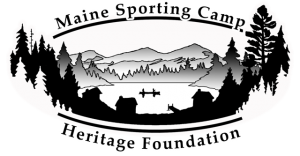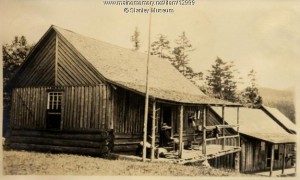The Foundation’s mission to preserve sporting camps focuses on the underlying land, its ownership and economics affecting the sporting camps. Land is the major asset and cost for sporting camps, and therefore control of the land is critical for each camp’s existence.
The Foundation pursues several avenues to gain control of that land so a sporting camp will remain as a viable entity upon it. All of these arrangements are negotiated at arm’s-length, and reflect commercially reasonable terms based on the determination by the Foundation’s Board of Directors.
Foundation Solutions
The Foundation will engage in several activities to address these challenges. Once the Foundation has completed its capital campaign, it intends to use a portion of the proceeds and the earnings thereon to offer low-cost financing to owners and operators of sporting camps for a limited range of purposes. These would include, for example, providing capital for upgrading camp facilities in order to make them more suitable for today’s visitors, and, in the case of sporting camps located on leased property, assisting in the acquisition of the underlying land in the event the land owner elects to offer the property for sale.
Eligibility for this assistance requires a camp owner or operator to demonstrate either that they were unable to obtain commercial financing for these purposes, or that the costs of commercial financing would undermine the economic viability of the camp’s operations. The camp owner or operator is also required to enter into some form of binding commitment that would prohibit the owner from selling the property to a purchaser that would not continue to operate the property as a sporting camp for the duration of the loan, and that would ensure the property continued to be used as a sporting camp for the use of the general public for some specified period of time.
In some instances, the Foundation will consider acquiring leased property in the event it is offered for sale by the landowner, and will then lease it the camp operator under affordable term. Again, as a condition for eligibility, the camp operator must demonstrate either that they were unable to secure their own commercial financial or that doing so would threaten the camp’s financial viability.
As owner of the property, the Foundation would be in a position to act as a steward for the camp’s continued operations and to ensure that it remained available for the use and enjoyment by the general public.
Re-Commercialization Solution
The Foundation also seeks opportunities to acquire properties that were once operated as commercial sporting camps but that had been sold or otherwise converted to private, exclusive-use facilities. These properties would be converted back into commercial sporting camps that would be made available to the public. The Foundation would either operate these sporting camps through employees or independent contractors, or would lease the properties to individuals that would, in turn, agree to operate the property as a sporting camp. In some cases, the Foundation would sell these properties to private individuals, but the sale would be subject to binding restrictions that the property would be used as commercial sporting camps in perpetuity.
The Land Economics Problem
The economic viability of many Maine sporting camps is being threatened by many factors. Camp operators are facing significantly higher operating costs while competing vacation alternatives and recreational opportunities are limiting their ability to increase rates. Most Maine sporting camps are “break-even” operations at best.
Many camp owners refer to their businesses as “a lifestyle choice” since their incomes are very limited by operating costs, capital costs and the seasonal nature of the business. Many take second jobs during winter, such as driving a heating oil delivery truck, or working at a ski area.
In many instances, these realities have caused camp owners to list their camps for sale. Prospective purchasers who would continue to operate the property as a commercial sporting camp frequently have limited access to capital. Those that do seek to finance the acquisition of a camp property discover that the operating revenue would be insufficient to support both the debt service costs plus operating expenses.
Consequently, sporting camp properties are often purchased by individuals and corporations who convert the property into a private vacation home or corporate retreat. A number of camps have been “taken private” in this way. These include Yoke Pond Camps and B Pond Camps.
Camps recently sold or currently for sale due to lack of sustainable revenue (recession notwithstanding) include Penobscot Lake Lodge, Eagle Lake Sporting Camps and Wapiti Camps. Lyford Pond Camps, Medawisla Camps, and Katahdin Lake Camps were recently bought by conservation oriented owners (nonprofit organizations) where potential commercial buyers could not afford to match the prices asked.
Wapiti Camps was recently purchased by a conservation minded individual after the former owners failed to attract a commercially interested buyer. Eagle Lake Sporting Camps was foreclosed upon after failing to generate sufficient revenue to cover operating and capital costs or to attract a commercial buyer – despite having been fully renovated. Fortunately, both os these are now back in commercial operation.
Short Term Lease Crisis
The operators of camps located on leased property face similar difficulties. Virtually all of the Northern Forest is owned by private industrial interests. Historically, property owners were predominantly Maine-based lumber, pulp and paper companies that would harvest timber to supply their own mills. These companies typically would lease camp lots on lakes, ponds, rivers and other desirable locations within their property to local families and persons associated with the company. These leases generally provided very low rates and often extended terms as long as 99 years in some cases.
However, most leases now renew automatically from year to year, with the lessees paying a relatively nominal annual lease payment for the right to use and occupy the property. The land company retained the right to harvest timber. Under these arrangements, many lessees built permanent structures on their leased properties based on the presumption that their leases would continue to renew indefinitely. Many, many traditional Maine sporting camps are located on property that is leased under this kind of arrangement.
As a result of corporate acquisitions, consolidation and other restructuring that has occurred in the timber, pulp and paper industry, ownership of Maine timberlands has gradually evolved to the point where a significant portion of the northern Maine woods is now owned by large multi-national companies and real estate investment trusts. Beginning in the late 1990s, in an effort to realize better returns on their investment, many of these companies began selling off lease lots located within their property.
Under Maine law, if a land owner desires to sell a leased lot, it must first offer to sell it to the lessee. The offering price for each property is typically its fair market value based on its highest and best use, which often means subdividing the property. If the lessee does not elect to purchase the lot, the land owner is free to list the property for sale on the open market.
For the operators of sporting camps located on leased property, the prospect of having to purchase the underlying property from the land owner can prove to be a Hobson’s choice. On the one hand they can choose not to purchase the property, in which case they will lose their investment and the property will most likely be sold to a wealthy individual or family that will convert it to private use. Alternatively, they can finance the acquisition of the property and thereby increase their operating costs to the point where, in many cases, it is no longer feasible to operate the property as a traditional sporting camp.
A study by Gore Flynn (Opportunity Assessment for Increased Nature-Based Tourism for Maine Sporting Camps and Guides, June, 2005) under an award from the Economic Development Administration, U.S. Department of Commerce (Project # 01-79-07250), surveyed sporting camp owners. The camps that reported the weakest levels of business were generally those that had not modernized. A reason for not making major improvements was the difficulties of obtaining loans for camps that are on leased property. The survey reported that many camps are on annually renewable leases, where lenders have concerns about collateral value in a camp that does not own its land, and that the biggest problem is in financing the acquisition of existing camps on leased land with bank debt.
The study also found that most sporting camp owners on leased land would prefer to purchase the land. At least two well-known sporting camp owners have been able to purchase their land after recent land ownership changes. Others reported trying to purchase the land, but have not yet been successful. Part of the problem is a reported disconnect between what the camp owners are able to pay for the land and the price at which landowners are willing to sell. Although many leaseholders have made significant investments in their facilities over time to upgrade plumbing, winterize and add other upgrades, many financial advisers would not consider this prudent.


